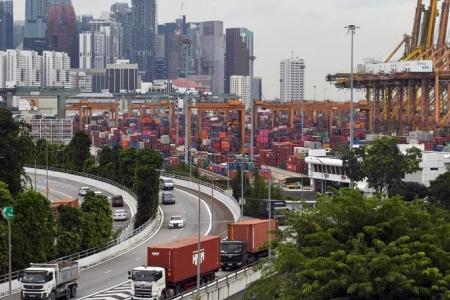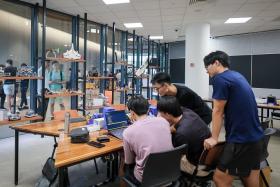Keep calm, be adaptable to deal with supply chain disruptions
In the face of supply chain disruptions, Singaporeans can do their part by staying calm and being adaptable, as doing so gives the country greater leverage when importing the goods it wants, said Education Minister Chan Chun Sing.
"In a crisis, if we all remain calm, we have a better chance to secure the things we want at prices we can afford," he said in an interview with The Straits Times that aired on Wednesday (Aug 31).
"Because when other people think that we are panicking, then (they) are more likely to jack up the prices.
"So that's why (with) some of the supply chain disruptions recently, when Singaporeans go about their life calmly, it gives us greater leverage, and that's something that we are very proud of," said Mr Chan.
Being flexible with our choices also helps, he said. "When one source of protein is not available, we switch to other forms of protein, whether it is fresh or frozen."
Singapore has three strategies to address supply chain disruptions, which have worsened due to the Covid-19 pandemic, the Ukraine war and other geopolitical tensions, he said.
It has been diversifying its imports and building up domestic production capabilities and stockpiles to protect against disruptions, and it will continue to do so.
The issue of economic challenges posed by changes in the geopolitical landscape was raised by Prime Minister Lee Hsien Loong in his National Day Rally speech earlier this month.
China's growth and exports are slowing, said PM Lee, and tariffs have been raised between the United States and China. Countries are also re-examining their supply chains to prioritise resilience and self-sufficiency.
In the interview with The Big Story, ST's online news programme, Mr Chan said the disruptions caused by the pandemic and other geopolitical developments are just one issue.
Another is how investment in energy capacity has not kept pace with potential demand, after a sharp drop in demand in the early days of the pandemic.
"And now, as demand recovers, you're seeing a bit of an imbalance, which is why many people predict that the high energy prices will be here for quite some time," he added.
The effects of climate change, from China to Europe, can also cause changes in food supply, he said.
Some countries might not sell certain goods to Singapore, even if they have surplus, and this is something Singapore has to be prepared for, said Mr Chan.
"During Covid-19... We called up our suppliers, our friends overseas, and said, 'Why don't you sell us this, since you have surplus?'"
They answered that they could not be seen to export certain goods because their population was worried, said Mr Chan, adding that this is a "big uncertainty" in the supply chain.
While Singapore has strategies at the national level to diversify and build up domestic production capacity and stockpiles, they are not without cost.
For instance, diversification is costly because economies of scale might not be reaped, said Mr Chan. Growing vegetables or other food domestically also means the need to source for other goods, such as seeds.
One important lesson that Singapore has learnt through the pandemic, said Mr Chan, is that it must continue producing goods that others want, especially during a crisis.
"So it goes beyond money, and that's why, as part of our overall economic ecosystem, it is so important for us to produce things that people value, so people cannot easily bypass us," he said, citing examples such as the manufacturing of vaccines, petrochemicals, and semiconductors.
"These are all critical things that the world needs, even in a crisis, and that gives us greater confidence that we can better secure all the things that we need."
Get The New Paper on your phone with the free TNP app. Download from the Apple App Store or Google Play Store now


